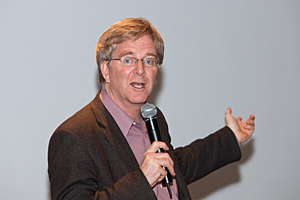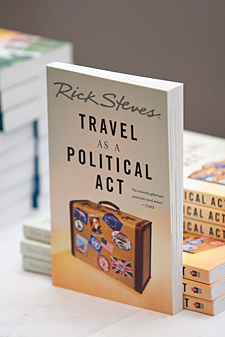ADVERTISEMENT
- Rozovsky wins prestigious NSF Early Career Award
- UD students meet alumni, experience 'closing bell' at NYSE
- Newark Police seek assistance in identifying suspects in robbery
- Rivlin says bipartisan budget action, stronger budget rules key to reversing debt
- Stink bugs shouldn't pose problem until late summer
- Gao to honor Placido Domingo in Washington performance
- Adopt-A-Highway project keeps Lewes road clean
- WVUD's Radiothon fundraiser runs April 1-10
- W.D. Snodgrass Symposium to honor Pulitzer winner
- New guide helps cancer patients manage symptoms
- UD in the News, March 25, 2011
- For the Record, March 25, 2011
- Public opinion expert discusses world views of U.S. in Global Agenda series
- Congressional delegation, dean laud Center for Community Research and Service program
- Center for Political Communication sets symposium on politics, entertainment
- Students work to raise funds, awareness of domestic violence
- Equestrian team wins regional championship in Western riding
- Markell, Harker stress importance of agriculture to Delaware's economy
- Carol A. Ammon MBA Case Competition winners announced
- Prof presents blood-clotting studies at Gordon Research Conference
- Sexual Assault Awareness Month events, programs announced
- Stay connected with Sea Grant, CEOE e-newsletter
- A message to UD regarding the tragedy in Japan
- More News >>
- March 31-May 14: REP stages Neil Simon's 'The Good Doctor'
- April 2: Newark plans annual 'wine and dine'
- April 5: Expert perspective on U.S. health care
- April 5: Comedian Ace Guillen to visit Scrounge
- April 6, May 4: School of Nursing sponsors research lecture series
- April 6-May 4: Confucius Institute presents Chinese Film Series on Wednesdays
- April 6: IPCC's Pachauri to discuss sustainable development in DENIN Dialogue Series
- April 7: 'WVUDstock' radiothon concert announced
- April 8: English Language Institute presents 'Arts in Translation'
- April 9: Green and Healthy Living Expo planned at The Bob
- April 9: Center for Political Communication to host Onion editor
- April 10: Alumni Easter Egg-stravaganza planned
- April 11: CDS session to focus on visual assistive technologies
- April 12: T.J. Stiles to speak at UDLA annual dinner
- April 15, 16: Annual UD push lawnmower tune-up scheduled
- April 15, 16: Master Players series presents iMusic 4, China Magpie
- April 15, 16: Delaware Symphony, UD chorus to perform Mahler work
- April 18: Former NFL Coach Bill Cowher featured in UD Speaks
- April 21-24: Sesame Street Live brings Elmo and friends to The Bob
- April 30: Save the date for Ag Day 2011 at UD
- April 30: Symposium to consider 'Frontiers at the Chemistry-Biology Interface'
- April 30-May 1: Relay for Life set at Delaware Field House
- May 4: Delaware Membrane Protein Symposium announced
- May 5: Northwestern University's Leon Keer to deliver Kerr lecture
- May 7: Women's volleyball team to host second annual Spring Fling
- Through May 3: SPPA announces speakers for 10th annual lecture series
- Through May 4: Global Agenda sees U.S. through others' eyes; World Bank president to speak
- Through May 4: 'Research on Race, Ethnicity, Culture' topic of series
- Through May 9: Black American Studies announces lecture series
- Through May 11: 'Challenges in Jewish Culture' lecture series announced
- Through May 11: Area Studies research featured in speaker series
- Through June 5: 'Andy Warhol: Behind the Camera' on view in Old College Gallery
- Through July 15: 'Bodyscapes' on view at Mechanical Hall Gallery
- More What's Happening >>
- UD calendar >>
- Middle States evaluation team on campus April 5
- Phipps named HR Liaison of the Quarter
- Senior wins iPad for participating in assessment study
- April 19: Procurement Services schedules information sessions
- UD Bookstore announces spring break hours
- HealthyU Wellness Program encourages employees to 'Step into Spring'
- April 8-29: Faculty roundtable series considers student engagement
- GRE is changing; learn more at April 15 info session
- April 30: UD Evening with Blue Rocks set for employees
- Morris Library to be open 24/7 during final exams
- More Campus FYI >>
1:21 p.m., March 26, 2010----Travel writer Rick Steves is a firebrand preacher
Regular viewers of his PBS travel show, “Rick Steves' Europe,” may find it hard to envision. The jovial, khaki-clad Steves bounds around Europe taking in the sights while doling out advice about affordable hotels and best place to grab a crepe, a smile almost always genuinely occupying the real estate of his face.
But, he has a message and he's not afraid to sermonize. On Thursday, he brought it to Arsht Hall on UD's Wilmington campus as the featured speaker at the University of Delaware Library Associates annual dinner.
Steves preaches the transformative power of travel. The author of more than 40 travel books, he recently penned Travel as a Political Act. His speech of the same name encouraged audience members to go abroad to experience history and culture, but also to see what life is like for 96 percent of the planet's citizens, the ones who are not American.
“Travel should change you, get you out of your comfort zone,” he said. “When you travel you realize there's exciting struggles going on that we would be clueless to if we didn't get out there and talk to these people.”
To illustrate his point, Steves relayed the details of a trip to El Salvador. He was invited to celebrate the 25th anniversary of the assassination of Archbishop Oscar Romero, a champion of the poor in El Salvador. He told the dinner crowd that marching with the people through the city streets, visiting at the country's civil war memorial etched with the names of the dead, was the richest travel experience of his life, because he viewed the soul of the people there.
“I was in a bunk bed dorm, covered in bug bites, eating rice and beans one day and beans and rice the next,” he said, noting he chose the trip over another opportunity -- to relax on a Mexican beach.
Steves' devout followers, like dinner attendee Charlene Prucker, knew the basic tenets of his sermon well.
“He just gets past all the materialistic and really dives into the culture of the people,” she said.
Vignettes about interactions with locals popped up throughout his hour-long speech to more than 175 library supporters. Steves mentioned a conversation with an Irishman from the country's west coast: “I asked him, 'Have you lived here all your life?'” Steves relayed. “He said, 'Not yet.'”
Steves described an archeologist he knows as “the Indiana Jones of the (German region of) Tirol” and even discussed some of Europe's smaller inhabitants -- birds. Of the continent known for its advanced high-speed rail system, he said, “Europe's a dangerous place if you're a small bird.”
While he took a light tone in many of his stories, his message was a serious one, exemplified by a recent trip to Iran.
“People ask me, 'Why did I go to Iran?' I went to Iran because I think it's important to know people before you bomb them,” he said. “It's important we have a more reasoned understanding of why these people are saying 'damn America.'”
The prospect of visiting Iran scared him, he said, but what he saw enlightened him. Steves said he realized many of the people are victims of propaganda: frightened, poorly educated, fundamentalists, often parents. As one mother told him, “we just don't want our girls to be raised like Britney Spears.” Steves told the dinner crowd, “Neither do we.”
“I wanted to humanize the place and I had the greatest experience,” he said.
Steves' was invited to share his experiences by the UDLA, a group dedicated to expanding and enriching the knowledge base at the University through the library's special collections.
In his address at the dinner, UD President Patrick Harker described the event as “an unabashed celebration of research, study and scholarship.”
To that end, UDLA President Wilson Braun presented a check for $43,000, the proceeds of the event, to Harker and Susan Brynteson, UD vice provost and May Morris Director of Libraries. The money goes toward the acquisition of rare materials for the library's special collections.
As Steves wrapped up his presentation, he reiterated his challenge to travel as a political act, travel to broaden your perspective and come face to face with some of the world's less pleasant realities.
He ended with his own version of an amen, telling the crowd, “Happy travels!”
Article by Andrea Boyle
Photo by Kevin Quinlan




